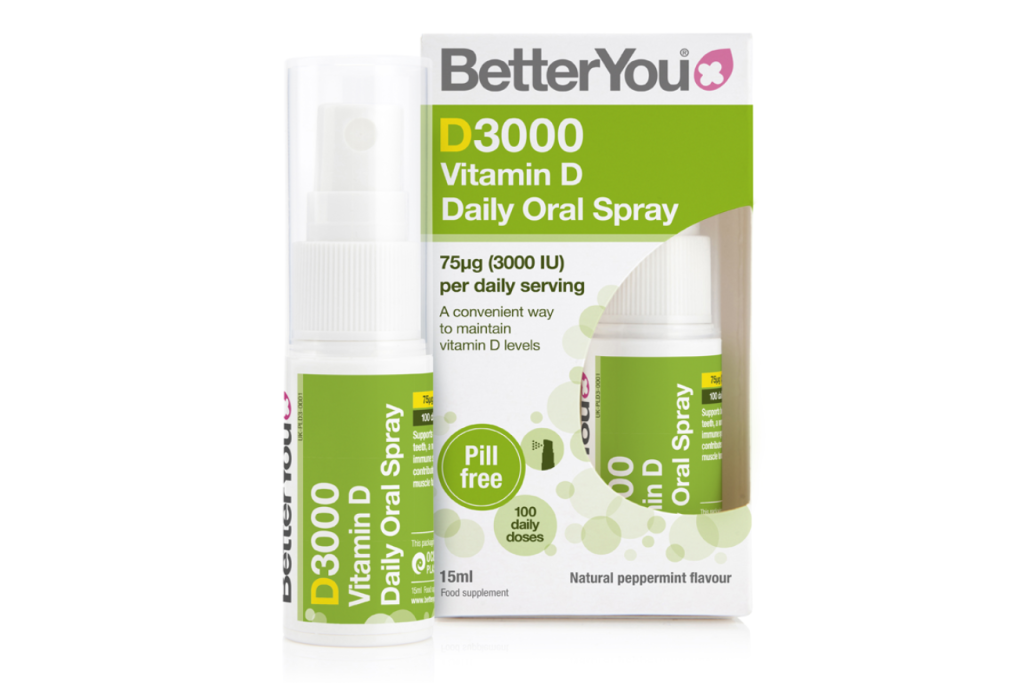By Health expert, Dr. Naomi Newman-Beinart (PhD)
In an ideal world, we would get all of our nutrients from the food that we eat. However, in a time where our diets are dominated by the convenience of fast foods and processed foods, it’s unlikely that everyone can easily meet their daily requirements of vitamins and minerals. One vitamin that has been in the press more than ever since it was found to play a protective role in COVID-19-related health outcomes, is vitamin D.
Health expert, Dr. Naomi Newman-Beinart (PhD) is here to tell you why supplementing with vitamin D is so important.
Vitamin D is one of the vitamins your body needs to work as it should. A lack can cause serious health problems if ignored. Many of the UK’s population are deficient in Vitamin D, which is vital for bone health, mood boosting and the immune system. This is essential through Winter and Spring especially, but can be helpful for some people to take all year round, especially those who work or live mostly indoors, those with darker skin, people over 65, pregnant and breastfeeding women, children under 5, and people who are vegan. The National Institute for Health and Care Excellence (NICE) (1) estimates that vitamin D deficiency in the UK affects one in five adults and one in six children – that’s 10 million of us!
So let’s take a closer look at what the signs, symptoms and risks are for people who don’t have enough vitamin D. Some signs are easier to spot than others, but here are some symptoms that may be signs that you are not getting enough vitamin D:
- Constant Coughs and Colds – Vitamin D is important for your immune health and vitamin D deficiency may mean your immune defences do not react properly when you come into contact with a cold. Did you know that supplementing with vitamin D may help to reduce the severity of COVID-19 symptoms? (2). Plus, a recent review of randomised controlled trials (RCTs), the gold standard of research, found that vitamin D supplementation resulted in decreased risk of death and reduced risk of ICU admission for people with COVID-19 (3). This certainly is strong evidence for the immune supporting benefits of vitamin D, and is particularly relevant with Winter just around the corner and nearly 7000 cases of COVID-19 in the UK during the last week of August (3).
- Aching Bones – Vitamin D supports bone health which works to support you by regulating calcium levels within the body. If you aren’t getting enough vitamin D your joints can weaken and you could be more at risk of stress fractures.
- Weak Muscles – Vitamin D is needed for normal muscle function. If your muscles are feeling weak, they may be losing strength due to vitamin D deficiency. This can be more common in older people because elderly people’s skin cannot make vitamin D as well as when they were younger.
- Feeling Low – Serotonin levels in the brain can be affected by vitamin D deficiency. Serotonin is known as the happy hormone because it is important in keeping your moods up and you feeling your best. A low mood, especially in winter, could be a sign of vitamin D deficiency.
Dietary sources of vitamin D include:
- Oily fish (tuna, mackerel, salmon)
- Eggs
- Dairy products (milk, cheese)
- Fortified foods (cereal, breads, juices)
- Mushrooms
For people who don’t eat these foods and get regular sunshine, it may be worth considering a vitamin D supplement. According to the NHS, the dosage you need each day is 10μg or 400 IU for adults. The safe upper limit for vitamin D being 100μg (4,000 IU) a day (5).
I recommend the BetterYou D3 Oral Sprays because BetterYou use science-backed intra-oral spray technology that delivers the active ingredient through the cheek (buccally) rather than relying on primary processing by the digestive system. The mouth is an excellent receptor for supplements because of its soft, absorbent tissue and because it is so close to the body’s vein system.
It’s really important to see your GP if you think you may be at risk of vitamin D deficiency. However, you can also do a really straightforward test at home if you are interested to know more about your vitamin D levels. BetterYou offer a postal service where you Order your vitamin D test online, do a simple finger prick test, and then post your sample to City Assays using the prepaid envelope. You will receive your results within 10 working days, and BetterYou will provide you with a bespoke supplement plan to help you increase or maintain your vitamin D. You’ll also receive a complimentary Vitamin D spray upon completion.



